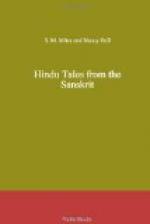In India everybody has a siesta, that is to say, a sleep in the middle of the day, because the heat is so great it is difficult to keep well and strong without this extra rest. So, although it is quite light at the time, the streets are deserted, except for the dogs who prowl about, trying to find something to eat. Now the Brahman loved his money and other treasures so much, that he used very often to do without this siesta and go to the forest to enjoy the pleasure of looking at them. When he got to the tree, he would bend down, clear away the earth and leaves with which he had hidden his secret hole, take out the money and let it slip through his fingers, and hold up the jewels to the light, to watch how they gleamed and glistened. He was never so happy as when he was alone with his riches, and it was all he could do to tear himself away from them when the time came to go back to his shady corner. In fact he was becoming a selfish miser instead of the holy man the people of Sravasti thought he was. By the time the siesta was over he was always back again in his place beneath the tree, holding out his bowl and looking as poor and thin as ever, so that nobody had the least idea of the truth.
3. Why was it wrong for the Brahman to hide away his money and jewels?
4. Can anyone be a miser about other things as well as money and jewels? If so, what other things?
CHAPTER III
For many months the Brahman led this double life; until one day, when he went as usual to his hiding-place, he saw at once that some one had been there before him. Eagerly he knelt down, full of fear of exactly what had actually happened. All his care in concealing the hole had been wasted, for it was quite empty. The poor man could not at first believe his own eyes. He rubbed them hard, thinking that there was something the matter with them. Then he felt round and round the hole, hoping that after all he was mistaken; and when at last he was obliged to believe the terrible truth that there really was not a sign of his money and jewels, he became almost mad with misery. He began to run from tree to tree, peering into their roots, and when there was nothing to be seen, he rushed back again to his empty hole, to look into it once more. Then he wept and tore at his hair, stamped about and cried aloud to all the gods he believed in, making all kinds of promises, of what he would do if only they would give him back his treasures. No answer came, and he began to wonder who could have done such a terrible thing. It must, he felt sure, have been one of the people of Sravasti; and he now remembered he had noticed that a good many of them had looked into his bowl with longing eyes, when they saw the money and precious stones in it. “What horrible, wicked people they are,” he said to himself. “I hate them. I should like to hurt them as they have hurt me.” As he thought in this way he got more and more angry, until he became quite worn out with giving way to his rage.




